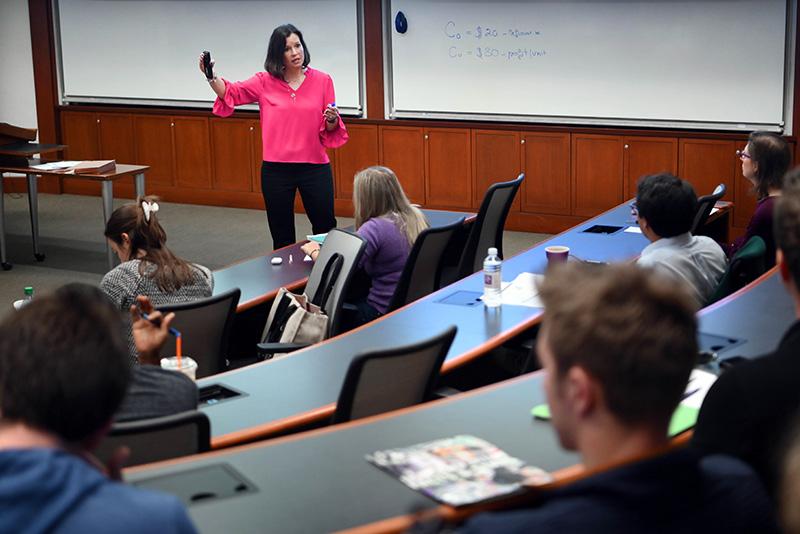Freeman announces new full-time MBA curriculum

To prepare future leaders to take on the complex challenges of today’s rapidly changing business environment, Tulane University’s A. B. Freeman School of Business has announced a new full-time MBA curriculum to begin in fall 2023.
Designed to be data intensive, highly experiential and future focused, the STEM-designated program leverages Freeman’s established strengths while delivering the knowledge, skills and experience sought by today’s top employers.
“Technological advances, climate change, geopolitical conflicts and social inequity are transforming the world at a staggering pace, and business leaders need new skills to navigate this volatile and highly dynamic environment,” said Paulo Goes, dean of the Freeman School. “The Freeman MBA was designed from the bottom up to provide business leaders with the knowledge and tools they need to meet today’s demands and tomorrow’s challenges.”
The product of more than a year of development and input from faculty, employers, alumni and other stakeholders, the curriculum is built on three key pillars: data-driven decision making, cross-functional experiential learning, and broad-based preparation for the business world of the future.
“With the new program’s focus on managerial data analysis, interdisciplinary experiential learning, and Environmental, Social and Governance (ESG), this curriculum is designed to prepare skilled business leaders who can excel not only in today’s business environment but also tomorrow’s,” said Carmen Weigelt, associate professor of management and chair of the MBA Curriculum Committee.
“It’s a program that’s highly focused on learning by doing,” added Xianjun Geng, senior associate dean for academic programs and a member of the committee. “The curriculum enables students to pull together knowledge from across different areas to solve problems for real companies and create lasting impacts.”
Highlights of the curriculum include:
- Two-credit first-year format. The new format, which divides the semesters into two seven-week terms, significantly expands the breadth of program content without increasing the total number of credit hours.
- Highly integrated data sequence. Prioritizing the ability to use data to make informed business decisions, the curriculum features a five-course sequence focused on real-world data-driven decision making for future managers. In addition to Business Statistics, new courses include Analytics for Managers, Financial Models for Business Decisions, Data-Driven Strategic Management and When Data Lie.
- Two weeklong intensive immersion courses. Experiential learning and team-based approaches to problem solving are emphasized in two immersive classes: Business Negotiations and Lead for Success, a new intensive course offered in partnership with the Center for Creative Leadership (CCL), a top-ranked global provider of executive education.
- Consulting Practicum. Coordinated through the new Center for Experiential Learning, this semester-long course puts student teams to work on significant projects for large companies with support from interdisciplinary faculty advisers.
- Impact Capstone. This new experiential learning course connects students with small businesses and non-profits in New Orleans to work on semester-long projects relating to environmental and social sustainability. Like the Consulting Practicum, the Capstone will be led by interdisciplinary faculty teams serving as project consultants and advisers.
- Environmental, Social and Governance (ESG) focus. With issues such as climate change, social inequities and energy sustainability expected to increasingly impact business, the new curriculum integrates ESG throughout required classes. Topics include climate change, the organizational and societal costs of environmental harm, data protection and security, corporate transparency, and supply chain resiliency against geopolitical instability.
- Optional global trip. In conjunction with the elective course ESG in a Dynamic Global World, students can participate in an international trip to gain a firsthand understanding of ESG best practices in an international arena.
- Speaker series. A new presentation series will feature prominent business leaders and highlight topics of interest to MBA students. In addition to learning about jobs, companies and career paths, students will have the opportunity to socialize and network with fellow students, faculty, alumni and members of the business community.
- New concentrations. In addition to Finance and Business Analytics, the curriculum offers new concentrations in Sustainability and Strategy & Marketing.
- Joint-degree options. Students have the opportunity to pursue a variety of joint-degree options, including a two-year MBA/Master of Sustainable Real Estate Development, a two-and-a-half year MBA/Master of Management in Energy, a three-year MBA/Master of Health Administration, a four-year JD/MBA, a five-year MD/MBA, and a five-year BA/ or BS/MBA.
“The A. B. Freeman School of Business has long been recognized for excellent and innovative offerings like Burkenroad Reports, the nation’s only university-sponsored securities analysis program,” Dean Goes said. “The new Freeman full-time MBA builds on that expertise with an academically rigorous core, cross-functional experiential learning opportunities throughout and an unwavering focus on the future of global business.”
Applications for the full-time MBA are now being accepted for fall 2023 admission. For more information about the program and curriculum, visit https://freeman.tulane.edu/graduate/full-time-mba.
Interested in advancing your education and/or career? Learn more about Freeman’s MBA programs. Find the right program for you.
Other Related Articles
- Alumna recalls trailblazing career in business, ministry
- Students network their way through Manhattan in annual Real Estate Trek
- Keeping it cool: MBAs help Convention Center find its temperature sweet spot
- Freeman Futurist Series looks at AI, Robotics and Quantum
- Louisiana’s economic momentum takes center stage at 46th Tulane Business Forum
- Every dog has its day at alums’ bar and restaurant
- Embracing Business Futurism: A Conversation with Cliff Farrah
- Alum creates scholarship to give students ‘freedom to take risks’
